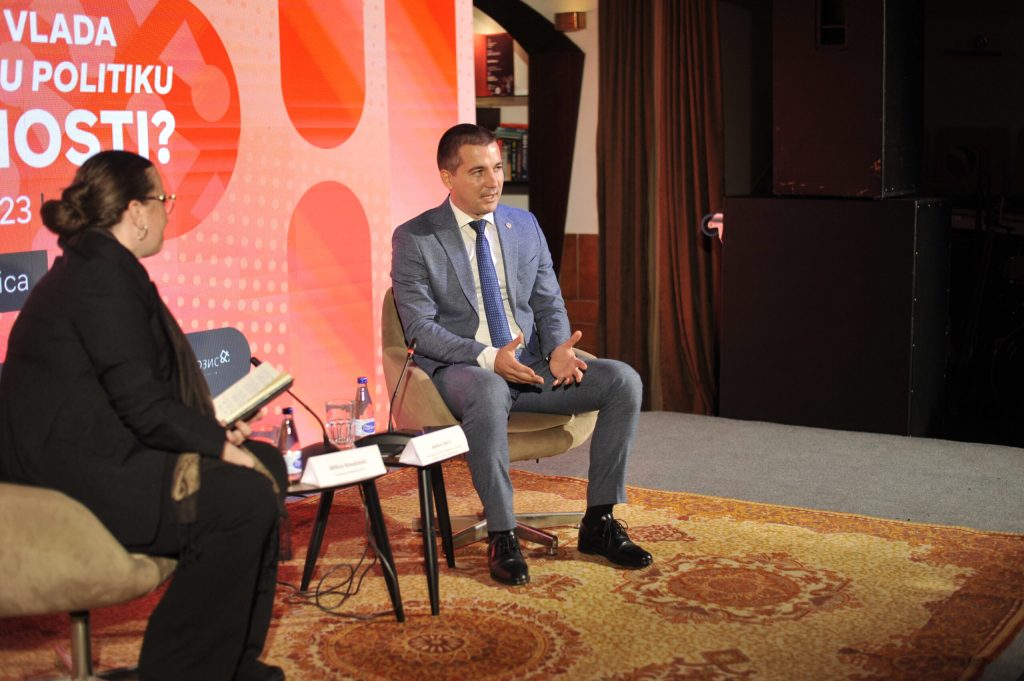
The conference on the openness and transparency of the executive power in the Western Balkans region, organized by the NVO Center for Democratic Transition (CDT) from Montenegro, was held on November 17 in Podgorica. The first part of the conference was dedicated to a conversation with the Vice President of the Government of Montenegro for Security, Internal Policy, European and Foreign Affairs Aleks Bečić, while in the second part representatives of the civil sector from Bosnia and Herzegovina, Montenegro, Serbia and North Macedonia spoke about the findings of research on openness of government in these countries.
CDT Program Director Milica Kovačević emphasized that the Government of Montenegro still has a lot to do in the field of transparency.
“In terms of openness, we are in third place after the Government of North Macedonia and the Council of Ministers of Bosnia and Herzegovina, our ministries are in third place, administrative bodies are in second place,” she said, presenting the research on government openness conducted by the CDT.
“Openness is decreasing towards lower levels, and it should be the opposite, because administrative bodies should be more accessible to citizens. We don’t have an umbrella policy of openness and a strategic approach, and political instability didn’t help that either. A lot depends on the will of the manager. For six years, we have been waiting for the improvement of the Law on Free Access to Information, three governments promised non-governmental organizations that they would improve the law, but that did not happen,” Kovačević said.
“I will advocate that we improve transparency. With the change of government, everyone is now aware that no one is politically eternal, some much faster than they hope, with the importance of transparency, our goal is to reach the level of having strong institutions where every government will preserve institutional memory, where no one will be interested in who is which religion, nation or party, where they will take turns at the top. I am fighting for a Montenegro with strong institutions where we are all politically transient, when we bring it to what European standards are, there will be no winter for Montenegro,” said Bečić.
The openness of institutions must not depend on the will of individuals, but must be grounded in laws and regulations in order to ensure the permanent establishment of transparency of their work. This was announced at the panel “What information governments hide from the media, civil sector and citizens” within the conference on transparency of institutions organized by the Center for Democratic Transition (CDT).
Milena Gvozdenović from CDT said that in Montenegro, in the last three years, we have changed the government or power three times, and that these are certainly not favorable circumstances for building a long-term policy of openness.
Mila Josifovska Danilovska from the Metamorfozis foundation from North Macedonia said that, although North Macedonia is the first in the region according to the openness index, it achieves the worst results in terms of efficiency.
“We may have great strategies, but when it comes to implementation, we’re a bit slow in that part,” she said.
Unlike North Macedonia, the situation in Bosnia and Herzegovina is worse in terms of openness, says Amina Izmirlić Ćatović, representative of U.G. Why not? from Bosnia and Herzegovina. Some setbacks were also noticed this year. She assessed that there are only a few institutions that could boast of a level of transparency and those that have a certain satisfactory result that could be further improved. She cited the positive example of the Public Administration Reform Coordinator’s Office, which in the 2022 survey had 84.81% fulfillment of indicators, respresents is the best result when it comes to openness and transparency in Bosnia and Herzegovina. Out of 49 administrative bodies, only 12 of them satisfy more than half of the indicators, and a certain number of institutions did not even have a functional website, or it did not exist, which influenced the much worse results of administrative bodies in the survey for 2022.
Even Serbia cannot boast of the transparency of its institutions. In 2022 alone, it was determined that more than 1,400,000 documents were marked with the secret mark, based on a sample of 73 authorities. Milica Tošić, from Partners for Democratic Changes, says that the government, ministries, and administrative bodies do not exceed the transparency index of over 50%.
The panelists say that institutions should take responsibility and be proactive, and that if they want to be open, infrastructure is not an obstacle, but political will is a big problem.
The results of this year’s monitoring show that governments in the countries of the region have not made significant progress in terms of proactive transparency and openness towards citizens.
The best results among governments are achieved by the Government of North Macedonia, which fulfills 79.14% of the indicators of openness, and the Council of Ministers of Bosnia and Herzegovina with 73.31% of the indicators of openness fulfilled.
It is followed by the Government of Montenegro (68.87%) and the Government of the Republika Srpska (54.94%), and at the bottom of the list are the Government of the Republika Srpska (38.2%), the Government of FBiH (37.57%) and the Government of the Autonomous Province of Vojvodina (31.3%).
When it comes to ministries, the best results on average are achieved by the ministries of North Macedonia with 61.58% fulfillment of the openness indicator. In other countries, ministries meet less than half of the set indicators – in Serbia 51.48%2, Montenegro 45.48%3, BiH 37.40%. On average, the administrative bodies in North Macedonia satisfy 54.04% of the openness indicators, followed by the administrative bodies of Montenegro (43.63%), Bosnia and Herzegovina (38.27%) and Serbia 35.10%. Read more about the policy document on government openness in BiH and the region here.
Documents:
Openness of the executive power in Bosnia and Herzegovina and the region
